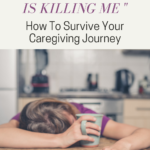
We titled this post with a quote from a forum, where someone simply said that caring for my elderly mother is killing me. In one sense, this sounds like a harsh thing to say, something that is overly pessimistic.
These days, we’re often taught the value of being positive and mindful. Of improving our self-talk and focusing on the good things. If you conduct a quick search online, you’ll notice many inspirational posts about caregiving, along with people who consider the process to be a blessing and a privilege, along with similar ideas.
And, this is all true. People often do see the positive aspects of the process and finding joy in caregiving is achievable (and important!).
Still, being constantly cheerful and positive isn’t helpful if you’re denying reality in the process. And, the modern focus on the positive sometimes means that we don’t talk about the very real physical and emotional challenges that come with caregiving.
Listen To This Post As An Audio:
Caregiving Is Hard

The phrase ‘caring for my elderly mother is killing me’ is one example of that. I’ve seen multiple people say something similar on online chat boards and forums and it’s clear that many people are struggling. In fact, the challenges are often much more intense than people on the outside know.
After all, caregiving can be an intense process, one that involves you making constant changes to your own life – some big and some small. For some people, this may mean a struggle to find privacy as a caregiver or that they have hardly any time to themselves at all.
For example, I was a caregiver for my disabled partner, while also being somewhat responsible for his mother, who lived with us. While she was still mostly competent there were areas that I had to help with and her perception of reality sometimes wasn’t very good.
The end result is that I rarely had any time to myself and most of the household responsibilities became mine, along with earning enough money for us to survive. While my partner greatly appreciated me, all his mother saw was what I wasn’t doing. Needless to say, that got physically and emotionally tiring fast.
In my case, I was a caregiver for around five years, although most of the stress and responsibility came in the final two years. I stopped being a caregiver following my partner’s death. I mourn that loss, of course, but I would be lying to say that there isn’t a degree of relief in there as well.
Yet, we’re often taught to focus only on the positive – to pretend that the process is simply challenging, rather than being overwhelming, devastating, and emotionally draining.
And… this really is something that we need to address.
Why Talk About the Negative?
When we constantly focus on the positives of caregiving, we undermine the challenges that people face. We act like people should be positive all the time, when in reality they may be barely holding on.
In many cases, caregiving may also actually be damaging your health. For example, research shows that the process can harm a women’s physical and mental health, while the same would be true for males as well.
This is no surprise, as caregiving tends to be an ongoing source of stress and often means that you compromise your own needs in the process.
Caregiving can also breed resentment, especially if you’re the only family member involved in the process. You may also find that you have had to put your own dreams aside, whether those dreams are in the form of career progression, marriage or something else entirely.
So, what can you do?
Finding Solutions
With caregiving, it can often feel like you have no choice. Either you continue to be a caregiver or your family member’s quality of life decreases dramatically. Many of us can’t imagine resigning our loved one to someone else’s care, especially with so many horror stories about elder abuse in institutions.
And realistically… there isn’t any single answer.
But, one thing that you can do is be honest with yourself about how you feel and what your options truly are.
Think About Alternatives
In some cases, the answer may simply be to get out.
For example, there are many myths about assisted living for seniors, including the idea that they will be abused or that they will hate it. Yet, in many cases, assisted living can offer a new lease on life, giving seniors the chance to spend time around people who are similar to them.
Likewise, your family member may actually receive better care from someone else, especially if you carefully research the options first.
After all, most family caregivers have no formal training and are often making things up as they go along. Furthermore, you’re typically trying to juggle multiple areas, such as employment, your own health, children and household tasks. As a result, your effectiveness is always going to be somewhat limited.
This won’t be a solution in every case, of course.
But, it is something to consider.
If you do so, try to leave your emotions at the door. People feel guilty when they say that caregiving is killing them or is immensely stressful. Yet, it can be.
My physical health certainly suffered as a caregiver and I know that happens to countless others as well.
Adjust Your Headspace
For some people, the answer may not be to stop caregiving but to reframe your views. For example, even if you feel forced into being a caregiver, there is always some choice involved.
If nothing else, you are choosing to remain in this role and to ensure that your family member is cared for and loved in a safe environment.
And, even when caregiving is exceptionally difficult, there are good moments. Focusing on these can be helpful, even when there aren’t many.
Practice Self-Care
Additionally, you can focus on your own needs more.
The nature of caregiving means that those involved tend to focus on their own needs last. The pattern is easy to get into and difficult to break. But, by not caring for yourself, you’re actually doing your family member a disservice.
For example, a lack of self-care can lead to caregiver stress and burnout, which makes you much less effective as a caregiver. What’s more, if your physical (or mental) health deteriorates, then you are never going to be able to care for someone else well.
So then, self-care is important and it doesn’t need to be difficult. Instead, there are various tools and techniques that you can use to promote your own health.
Now, I know that saying you should care for yourself is much easier said than done – I lived it myself.
Sure, for some people, taking time off or buying things for themselves is relatively easy. Yet, for others, it may be almost impossible.
- For example, some caregiving situations mean that the person you’re looking after cannot be on their own, not even for a short space of time. They may not trust anyone else either or you may have no family members that want to get involved.
In these cases, the best answer is to look for small solutions – little things that can make you feel better and can help with your health. Making your own small garden could be one answer here, as this is often therapeutic and can provide you with your own safe space.
Things that make you feel better emotionally can also be beneficial – whether that is having a bath every so often, getting a new piece of jewelry or reading a book.
Look For Help
You may also need to ask for help. Doing so often feels unachievable, especially if you have family members who simply don’t want to be involved.
Nevertheless, there are ways to ask for help that tend to be successful, simply because they are related to how the human mind works.
You can also find emotional help, which could include looking for therapy. Therapy can help improve your mental health and show you different ways to cope with your situation. TalkSpace is a powerful option, as this provides affordable online therapy.
Find Others
And also, just know that you’re not alone.
Caregiving is tough, exhausting and there often seems like no end in sight. There are various online groups and forums that you can find, many of which are filled with other people in a similar situation. For example, City Data has a caregiving forum, which can be a powerful place to turn to for advice and direction.
Even if you can’t find the answers you need this way, talking to people in a similar situation is often cathartic and can help you figure out your own best approaches.
Feeling Overwhelmed?
Check out our Caregiving Consulting service for personalized support and guidance.


I can relate to so much of this article, the good and the bad. My husband and I have looked after my mother who is now 99 for almost 4 years now. To begin with it was ok but gradually over time she became more and more difficult to deal with and we have felt more and more trapped. I couldn’t find anyway to get rid of the growing angst insides me and decided in the end to write a blog. It’s called shrinking horizons.com and has been a lifesaver. It acts almost like counselling and I can usually see things more clearly and with less resentment once I have put my feelings down in writing.
I’ve found that writing is amazingly therapeutic as well. It’s particularly important for caregiving because there are so many topics that are hard to talk about and views that are almost taboo.
I have been caring for my mom who has dementia for the last 5 yrs plus.i also suffer from different mental disorders.Anxiety,depression and ocd.My brother and sister both live far away and work for a living.they live approximately at least 250 miles away in another state.i live with my mom and have had to care for her with not a lot of help.My mom repeats things over and over.She has gotten worse over the last 2 or 3 months.I have really been suffering with depression and anxiety a lot over this time period.We have decided to put mom in assisted liiving,because she had a mental break and tried to cut her wrist ttwice,which I had to stop her from doing.ive just got to the point where I don’t have any patience and she is suffering because I can’t give the proper care to her.My question is ,are me and my brother and sister making the right decision by putting her in assisted living?
It can often feel like we’re letting a family member down when they enter into assisted living. But, the truth is that sometimes we just don’t have the resources to provide the care a person needs. It sounds like in your case, your mother is going to get better care in assisted living than your family could practically provide. That’s not a bad thing. The staff will be much more trained than you and have many more resources.
Try caring for someone who is total care..feeding, toileting, teeth cleaning, etc. and struggling with them the whole way–they often resist care. You have no concept of stress until you care for someone that bad off.
Some caregiving roles are harder than others, that’s true. Even so, that doesn’t mean other caregivers don’t experience stress or challenge. It’s important not to treat another person’s struggles as meaningless, simply because yours are objectively worse.
I care for my mother for the past several months full time. I have had to quit multiple jobs to either be closer to home or find schedules that allowed me to be more available to her. She was previously in a rehab home where she nagged me every day to get her out and become her caregiver. I resisted as long as I could because I knew this wouldnt go well but its mentally grating to have someone cry to you and manipulate you multiple times a day. They are trained and have proper equipment where I do not, right?
Realistically I have been helping her most of my life. I feel like I was often the parent in our relationship and was left to my own devices at an early age. It infuriates me that she says hurtful and resentful things towards me, she always has and always will. It hurts but nobody seems to care. My dad and his wife dont seem to understand what I go through. I have no siblings. Whatever is left of her family doesnt get involved. The home care agency I have linked up to offers little to no support and cant bother to respond to calls or emails. My own partner basically ignores us both and my mother seems all too happy to undermine the whole process and me by misrepresenting how bad off she is to her medical team. I will never do this again. Irs hard for me to even say or think out loud how under prepared, over stressed and depressed this has left me
I’m so sorry to hear about how difficult and overwhelming your experience has been.
Despite all the rhetoric about caregiving being a blessing and a chance to connect with loved ones, many people do have experiences like yours where things are incredibly difficult and they are underappreciated from start to finish.
Have you been able to find some things in your life that give you joy? It doesn’t sound like you have much of a support system, which is frustrating. Do you know of any other caregivers or some caregiver support groups in your area? Another person going through similar challenges may have some ‘out of the box’ ideas.